Roswell Weidner
Roswell Weidner (September 18, 1911 – September 22, 1999) was an American artist known for his paintings, charcoal and pastel drawings, and prints. His subject matter included still life, landscapes, and portraits. He was a student at the Pennsylvania Academy of the Fine Arts (PAFA) city school and country school in Chester Springs, and the Barnes Foundation. He worked in the Works Progress Administration Arts Project during the Great Depression and in a shipyard as an expediter during World War II. Weidner began teaching at the Pennsylvania Academy of the Fine Arts in 1938. He was associated with the academy for 66 years, first as a student and later as a teacher, until his retirement in 1996.[1]
Roswell Weidner | |
|---|---|
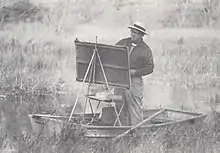 | |
| Born | Roswell Theodore Weidner September 18, 1911 Reading, Pennsylvania, U.S. |
| Died | September 22, 1999 (aged 88) Philadelphia, Pennsylvania, U.S. |
| Resting place | New Jersey Pine Barrens |
| Nationality | American |
| Spouse(s) | Doris Kunzie Weidner (m. 1938-1956), American artist; Marilyn Kemp Weidner (m. 1957-1999), Conservator of Art on Paper |
Early life and training
| External audio | |
|---|---|
Roswell Weidner was born in Reading, Pennsylvania on September 18, 1911. His father, Harry, was an iron puddler who lost his job and the family savings in the Great Depression. Harry Weidner worked on road crews as part of WPA and made bootleg liquor.[2] Weidner's mother, Almeda Hughes, who only had a fourth grade education, taught him his multiplication tables before he went to school.[2] Weidner's youth included hunting and fishing with his father, which provided still life subjects for his early artwork.[2][3] He was a member of the Reading Senior High School art club which took frequent trips to nearby art shows.[3] The instructor for the art club was Italo L. De Francesco[4] who later became the Art Director, then President of Kutztown University from 1959-1967. De Francesco was instrumental in Weidner's admission to the Reading Museum drawing classes while he was still in high school.[3][5]
In 1930, Weidner received a scholarship from Reading Senior High School in Pennsylvania[2] to attend the country school of the Pennsylvania Academy of the Fine Arts (PAFA) in Chester Springs.[6] Weidner got odd jobs at the school including working for the English gardener mowing lawns, weeding, cleaning out the swimming pool, and doing dishes.[7] This gave Weidner opportunities to work outside and enjoy nature and the outdoors. Weidner was known for his energy and strength which was needed to maintain the gardens on this large property. He attended the country school until 1934 when PAFA closed it as a year-round school. Weidner was awarded the Cresson Traveling Scholarship in 1935.[8][9] He completed his studies at PAFA's city school in Philadelphia in 1936. He also studied at the Barnes Foundation in Merion, PA, from 1934-1936. Weidner met Doris (Dorcas) Kunzie at Chester Springs Art School whom he married in 1938.[3]
Works Progress Administration
.jpg.webp)
In 1936, the Works Progress Administration (WPA) accepted Weidner for its National Youth Administration program. For the NYA, Weidner worked at the Pennsylvania Academy of the Fine Arts in the library cataloging books. In the 1989 Smithsonian Archives of American Art interview, Weidner pointed out that the PAFA library at the time didn't have art books but rather first editions "like Uncle Tom's Cabin". Art students at the time didn't have access to color reproductions and there were very few modern art books.[3]
Weidner turned 25 in September 1936 and aged out of the NYA. At that point he was moved to the WPA Art Project. In a 1986 interview with David R. Brigham,[10] Weidner said that he created drawings in the margins of the booklets that the children could color in. He was later assigned to the Museum Project in West Philadelphia and created animals for dioramas for museums. He requested a transfer to the Painting Section where he had to create one oil painting per month. The paintings were given to Federal Buildings including schools. Much of this art has been lost.[11] Finally, he worked in the WPA Graphics Arts Workshop (Print Section) in Philadelphia with Dox Thrash, Michael J. Gallagher and Hugh Mesibov.[12][13] Weidner created a Portrait of Dox Thrash[14] (lithograph) while they worked together.[15][16] Prints of most of the 21 etchings, lithographs or carborundum prints created by Roswell Weidner while on WPA are in the Philadelphia Free Library print collection.[17]
Artist and teacher
.jpg.webp)
In 1938, Weidner was offered and accepted a teaching position at the Pennsylvania Academy of the Fine Arts.[18] He left the WPA at this time and was not part of WPA when it was liquidated in 1943. His early successes in art exhibitions at the Carnegie International in Pittsburgh, Corcoran Biennial in Washington, D.C.,[19] and PAFA Annual Exhibitions [20] in Philadelphia resulted in his inclusion in the 1939 New York World’s Fair representing Pennsylvania.[21]
Weidner's teaching and art were interrupted in 1941 with the advent of World War II. He was laid off from PAFA and took night courses to be able to read blueprints.[3] He was hired by the John H. Mathis & Company Shipyard in Camden, NJ, as an expeditor, marine pipefitter, layout man, and marine draftsman. During this time Weidner got special permission to paint pictures of men working on the docks at the shipyard. One of these paintings is in the collection of the Independence Seaport Museum. In 1944, as the war was ending, another construction company offered Weidner a job in South America but at the same time he received an offer to return to teaching at PAFA. He decided to take the teaching position.[3]
Also in 1944, Roswell and Doris Weidner bought a farm outside Philadelphia in Christiana, PA with the money he saved while working at the shipyard. Weidner returned to teaching painting, drawing and lithography at PAFA and the Philadelphia College of Art. The farm and surrounding area including the Mercer's Mill Covered Bridge were frequent subjects of Weidner's art in the 1940s and 1950s.[3] In 2001 the farm was the subject of a novel by Jack Lindeman, "Appleseed Hollow", in which he describes life on the farm in the late 1950s.[22]
During his career as an instructor at PAFA, Weidner taught various art media (graphics arts, lithography, painting, and drawing) and levels of students but he was also involved with decisions regarding the school. As a faculty member he worked with the administration on a number of issues most notably the use of the Belgravia Hotel (which was later named the Peale House) as studios for advanced students and faculty. Weidner took over management of the PAFA evening school and boosted attendance from 28 to over 200 per semester in the late 1950s and early 1960s. Weidner also served as president of the Pennsylvania Academy of Fine Arts Fellowship (alumni association) from 1955-1967.[3][23][24]
Growth of artistic style
| External audio | |
|---|---|
Until the mid-1950’s Roswell Weidner was content to paint in the style of his early teachers at the Academy that included Henry McCarter, George Matthews Harding, Daniel Garber, Francis Wayland Speight and Joseph Pearson Jr.[3][7] He described himself as a Jack-of-all Trades since he was proficient in landscape, portrait, figure and still life painting. Influences of post-impressionist painting at the Barnes Foundation and of Japanese art permeated his work.[2] Despite the popularity of subsequent trends, such as the use of color in ‘Op Art”, the hard edges of ‘Pop Art’ and the simplicity of ‘minimalism', Weidner continued to paint nature in a realistic style. His work became more ambitious in scale and incorporated the Oriental concept of space while retaining Western form of modeling, light and perspective. He also returned to drawing – large, powerful but delicately executed charcoals.[2]
In the 1960's and early 1970's, Weidner's landscapes mostly focused on Smithville, Burlington County, New Jersey; Cheyney, Pennsylvania; and the area around Danville, Vermont, and the coast of Maine particularly near Bristol, Maine. In 1956, Weidner and his first wife divorced, and Weidner lost the Christiana farm which had been a source of inspiration for his landscapes.[2] In 1957, he married Marilyn Kemp. During this time, the growing Weidner family would spend entire summers at locations so that he could paint. Weidner also drove his emerald green Ford van to Maine to paint views of oceans waves crashing against the shore.[2]
In 1974, Weidner discovered the New Jersey Pine Barrens. At his campsite, deep in the Wharton State Forest, he found solitude where he could work undisturbed from morning until dusk, following the changing colors and light of the seasons. He called it his “Paradise”.[7] In an article in American Artist in 1980, Bill Scott (artist) describes Weidner's style in this way:
"In his landscapes, Weidner takes a greater liberty in changing and rearranging the colors and shapes he sees than in his figure paintings. The dominant element in his work continues to be the intensity and vibrancy of his colors - strong violets, blues and greens. While his earlier work was "fluid"-looking, his paintings now have the dry surface and brilliant color of pastel."[7]
The Philadelphia Inquirer Art Critic from 1962 to 2012 was Victoria Donohoe,[25] who wrote the following about Weidner's 1981 show at the Marian Locks Gallery in Philadelphia:
"Weidner's talent was nurtured on Renoir and apparently on Monet's paintings of his famed garden at Giverny. Weidner hasn't attained the extraordinary refinement of their observation of momentary effects of light and color, but there's a robust directness in Weidner's work and fidelity of record as he zeroes in on the ground plane without looking skyward at all. To a larger extent than before, the quality of the artist's own reactions is now felt, as he goes about finding his inspiration in the outer aspects of nature. Weidner takes the colors of nature and heightens them considerably. He has shown increasing curiosity about color. Now he sometimes gets combinations to work that shouldn't. In this show, particularly in the pastels with the softer, quieter range of hues, Roswell Weidner can be appreciated as the fine landscapist he is. It's through a display such as this that artists may hope to regain appreciation of the fact that a natural source of art's interest, and one of its major functions, is to give expression to one's own locality and to living life naturally."[26]
Selected exhibitions
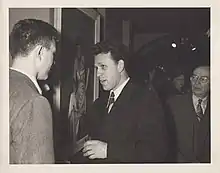
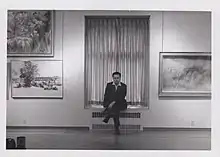
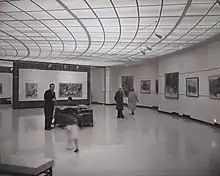
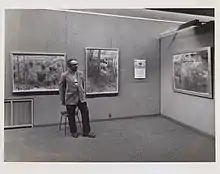

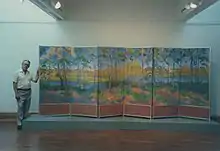
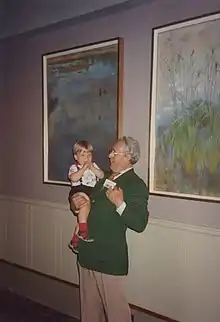

- WPA Exhibitions, 1938-1942 [27][28][29][30][31][32][33][34][35][36][37][38][39][40][41][42][43][44][45][46][47][48]
- Corcoran Gallery of Art Sixteenth Biennial, Washington, D.C., 1939 [19]
- "American Art: Graphic Arts", 1939 New York World's Fair, New York City, New York [21][49]
- "Directions in American Painting" Carnegie Museum of Art, Pittsburgh, PA, 1941 [50]
- "Artists for Victory: An Exhibition of Contemporary American Art : Paintings, Sculpture, prints" sponsored by Artists for Victory, Inc. The Metropolitan Museum of Art, New York, New York, 1942 [51]
- National Academy of Design 116th Annual Exhibition of contemporary American painting and sculpture, New York City, New York, 1942 [52]
- The Biennial at the Corcoran Gallery of Art, Washington, D.C., 1943 [53]
- National Academy of Design 120th Annual Exhibition of contemporary American painting and sculpture, New York City, New York, 1946 [54]
- "Roswell Weidner", Philadelphia Artist's Gallery, Pennsylvania Academy of the Fine Arts, Philadelphia, PA, 1948 [55][56]
- "Paintings by Roswell Weidner" at the Beryl Lush Gallery, Philadelphia, PA, 1953 [57]
- "The Peale House Galleries of the Pennsylvania Academy of the Fine Arts present and Exhibition of Paintings and Drawings by Roswell Weidner", Philadelphia, PA, 1966 [58]
- "Paintings and Drawings by Roswell Weidner" at the William Penn Memorial Museum (aka, State Museum of Pennsylvania), Harrisburg, PA. Sponsored by the Pennsylvania Historical and Museum Commission, 1966 [59]
- "Roswell Weidner Paintings & Drawings Exhibition Selected from 1938 to the present" at the McCleaf Gallery, Philadelphia, PA, 1970 [60]
- "The New Deal and the Artist: An Exhibition of the 40th Anniversary of the Founding of WPA", Historical Society of Pennsylvania, Philadelphia, PA 1975 [61]
- "Paintings and Drawings of the Out-of-Doors by Roswell Weidner" Newman Galleries, Philadelphia, PA, February 1978 [62][63]
- "Summer of 1978" New Paintings and Pastels by Roswell Weidner, Woodmere Art Gallery (aka, Woodmere Art Museum), Philadelphia, PA, Nov-Dec 1978 [64][65]
- "Southern New Jersey Landscape" Long Beach Island, Foundation of The Arts and Sciences, July 1980 [66]
- "The Pine Barrens by Roswell Weidner" Marian Locks Gallery, Philadelphia, PA, May 1981 [67][26]
- "Roswell Weidner" Peale House Galleries of the Pennsylvania Academy of the Fine Arts, Philadelphia, PA, 1985 [68]
- "Roswell Weidner Paintings & Pastels of the '80's" Newman Galleries, Philadelphia, PA, April 1987 [69]
- "WPA - A Philadelphia Retrospective", Philadelphia, PA 1988 [11][70][71][72][73][74]
- "Living Treasures" University City Science Center, Philadelphia, PA, February 1998 [75]
- "Arts at Crozer" Crozer-Chester Medical Center, Upland, PA, November 1990 to January 1991 [76]
- "A Tribute to Roswell Weidner" Museum of the Pennsylvania Academy of the Fine Arts, Philadelphia, PA, August 2001 [77]
- "Ode to the Jersey Pine Barrens" The Noyes Museum of Art, Loveladies, NJ, July 2002 [78][79]
- "A retrospective of the work of Roswell Weidner, 1911-1999" at The Gallery at Bristol-Myers Squibb, Lawrence Township, NJ, 2004 [80]
Selected collections
- Chester County History Center[81][82]
- Franklin D. Roosevelt Presidential Library and Museum Artifact Collection, National Archives [83]
- Free Library of Philadelphia WPA Collection [17]
- Frick Art Reference Library[84]
- Library of Congress[85]
- Pennsylvania Academy of the Fine Arts (PAFA)[86]
- Pennsylvania Convention Center[87][88]
- Picker Art Gallery, Dr. Luther W. Brady Collection, Colgate University [89]
- Philadelphia Museum of Art[90]
- Reading Public Museum[91]
- Smithsonian American Art Museum[92]
- The Metropolitan Museum of Art[93]
- University of Pennsylvania[94]
- U.S. General Services Administration (GSA) [15]
- WPA Artwork in Non-federal Repositories [95]
Recognition
- 1935 Pennsylvania Academy of the Fine Art (PAFA) 140th Annual, Cresson Traveling Scholarship[8][9]
- 1936 PAFA 141st Annual, Toppan Drawing Prize [7]
- 1943 PAFA Fellowship Prize [96][97]
- 1965 PAFA 160th Annual, Philadelphia Watercolor Club Dawson Memorial Award [98][99]
- 1972 Philadelphia Watercolor Club Dawson Memorial Award [100]
- 1975 Philadelphia Watercolor Club Dawson Memorial Award [101]
- 1975 PAFA Fellowship at the Woodmere Gallery The Percy Owens Award for a Distinguished Pennsylvania Artist [101]
- 1977 PAFA Fellowship The Thornton Oakley Memorial Prize [102]
- 1985 Who Was Who in America 1985-present [103]
- 1996 PAFA Dean's Award for Distinguished Service to the School
- 1998 "A Philadelphia Treasure" Liberty Bell Award, presented by Mayor Edward G. Rendell, City of Philadelphia, PA [75]
Gallery
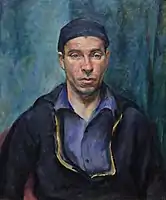 Portrait of a Man by Roswell Theordore Weidner, c. 1935, oil on canvas. Courtesy of the Reading Public Museum, Reading, Pennsylvania.
Portrait of a Man by Roswell Theordore Weidner, c. 1935, oil on canvas. Courtesy of the Reading Public Museum, Reading, Pennsylvania.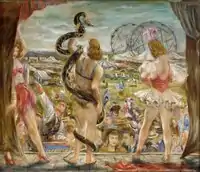 The Country Fair by Roswell Weidner, c. 1938, oil on canvas. Collection of the Pennsylvania Academy of the Fine Arts
The Country Fair by Roswell Weidner, c. 1938, oil on canvas. Collection of the Pennsylvania Academy of the Fine Arts.jpg.webp) Industrial Town 2 by Roswell Weidner, c. 1938 (see carborundum printmaking). Shown at the 1939 New York World's Fair
Industrial Town 2 by Roswell Weidner, c. 1938 (see carborundum printmaking). Shown at the 1939 New York World's Fair.jpg.webp) Winter on Spring Street by Roswell Weidner, c. 1938, lithograph. Collection of the Library of Congress
Winter on Spring Street by Roswell Weidner, c. 1938, lithograph. Collection of the Library of Congress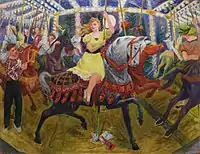 Merry-Go-Round by Roswell Theordore Weidner, c. 1948, oil on canvas. Courtesy of the Reading Public Museum, Reading, Pennsylvania.
Merry-Go-Round by Roswell Theordore Weidner, c. 1948, oil on canvas. Courtesy of the Reading Public Museum, Reading, Pennsylvania.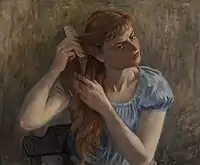 Dorcas Combing her hair by Roswell Weidner, c. 1942, oil on canvas. Collection of the Pennsylvania Academy of the Fine Arts
Dorcas Combing her hair by Roswell Weidner, c. 1942, oil on canvas. Collection of the Pennsylvania Academy of the Fine Arts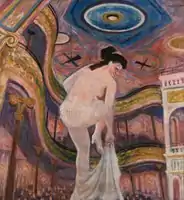 Burlesque Queen by Roswell Weidner, c. 1955, oil/tempera on burlap. Collection of the Pennsylvania Academy of the Fine Arts. (Interior of the Trocadero Theatre in Philadelphia, PA)
Burlesque Queen by Roswell Weidner, c. 1955, oil/tempera on burlap. Collection of the Pennsylvania Academy of the Fine Arts. (Interior of the Trocadero Theatre in Philadelphia, PA)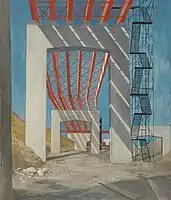 Concrete, Steel, and Sky by Roswell Weidner, 1958, casein on canvas. Collection of the Pennsylvania Academy of the Fine Arts
Concrete, Steel, and Sky by Roswell Weidner, 1958, casein on canvas. Collection of the Pennsylvania Academy of the Fine Arts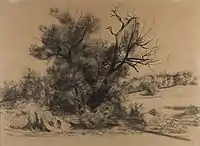 The Willow Tree by Roswell Weidner, 1964, charcoal on paper. Collection of the Pennsylvania Academy of the Fine Arts
The Willow Tree by Roswell Weidner, 1964, charcoal on paper. Collection of the Pennsylvania Academy of the Fine Arts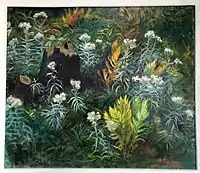 Tree Stump and Wild Flowers by Roswell Weidner, 1965, oil on canvas.
Tree Stump and Wild Flowers by Roswell Weidner, 1965, oil on canvas.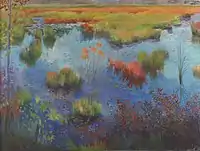 Upstream by Roswell Weidner, 1979, pastel on paper. Collection of the Pennsylvania Academy of the Fine Arts
Upstream by Roswell Weidner, 1979, pastel on paper. Collection of the Pennsylvania Academy of the Fine Arts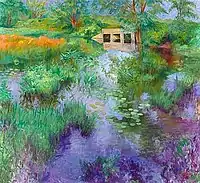 The Dam by Roswell Weidner, 1980, pastel on paper.
The Dam by Roswell Weidner, 1980, pastel on paper.
Personal life
Weidner's personal life could be divided into two parts based on his marriages. The first part of his life continued up to the divorce from his first wife, Doris ("Dorcas") Kunzie Weidner, in 1956. Doris and Roswell went to art school together at Chester Springs and PAFA.[6] They bought and lived on a farm in Christiana, Pennsylvania, and a home in Philadelphia near PAFA. They painted, exhibited in art shows,[104][105][106] judged art shows,[107] and worked on the farm together.[108] Doris Kunzie Weidner continued to paint and live on the farm after their divorce until her death in 2000.[109]
The second part of his personal life started in 1957 when Weidner married his second wife, Marilyn Kemp Weidner. Marilyn and Roswell Weidner lived in Center City, Philadelphia. Marilyn also painted with Roswell but their true partnership was their interest in conservation of art both on paper and canvas.[3] Marilyn Kemp Weidner founded the Conservation Center for Art and Historic Artifacts (CCAHA) in 1977 in Philadelphia, PA, with the help of her husband. Roswell Weidner retired from teaching at PAFA in 1996 at the age of 85.[23]
Weidner died in his home in Philadelphia with his wife Marilyn and his daughters by his side. His ashes were scattered in the New Jersey Pine Barrens.[1][110]
References
- Sama, Dominic (September 26, 1999). "Roswell Weidner, 88, artist and teacher". The Philadelphia Inquirer. Philadelphia, PA. p. C16 – via Newspapers.com.
- Weidner, Marilyn (Winter 2004–2005). "Roswell Theodore Weidner (1911-1999) Famed Artist of the Pine Barrens was Berks County Native". Historical Review of Berks County. Historical Society of Berks County. 70 (1): 27–31. ISSN 0018-2524.
- Pacini, Marina. "Oral history interview with Roswell Weidner". Smithsonian Archives of American Art. Smithsonian. Retrieved December 22, 2020.
- "Italo De Francesco of Kutztown State". The New York Times. May 26, 1967. p. 47. Retrieved May 3, 2021.
- Waggoner, Priscilla. "Transcript of Interview with Roswell Weidner". Historic Yellow Springs. Retrieved February 5, 2021.
- Lukens, Rob (2007). Yellow Springs. Charleston, SC: Arcadia Pub. ISBN 9780738550411.
- Scott, William (December 1980). "ROSWELL WEIDNER Painting in the Pine Barrens". American Artist. 44 (461): 68–73.
- "Reading Youth Wins Art Award". The Philadelphia Inquirer. Philadelphia, PA. May 23, 1935. p. 1 – via Newspaper.com.
- "131st Annual Report for the Pennsylvania Academy of the Fine Arts · PAFA's Digital Archives". pafaarchives.org. p. 3. Retrieved March 9, 2021.
- Brigham, David R. (October 31, 1986). "Interview with Roswell Weidner, Artist". Free Library of Philadelphia Art Department Research Files. Please consult Art Department librarians for access. Retrieved July 21, 2021.
{{cite journal}}: Cite journal requires|journal=(help) - Slobodzian, Joseph (August 20, 1987). "Dusting off 'the public's treasury'". The Philadelphia Inquirer. Philadelphia, PA. p. C1 and C4 – via Newspaper.com.
- Ittmann, John W. (2001). Dox Thrash : an African American master printmaker rediscovered. Philadelphia, PA: Philadelphia Museum of Art. ISBN 0-87633-151-7.
- McKinzie, Richard D. (1973). The New Deal for Artists. [Princeton]: Princeton University Press. p. 117. ISBN 0691005842.
- "Dox Thrash". SAAM. Retrieved March 14, 2021.
- "Roswell Weidner Artist Overview". U.S. General Services Administration.
- Russ, Valerie (December 27, 2020). "Fight wins a second chance for historic Phila. house". The Philadelphia Inquirer. pp. B1, B4. Retrieved March 7, 2021 – via Newspapers.com.
- "Free Library of Philadelphia WPA Collection". Free Library of Philadelphia. Philadelphia, PA.
- "Academy of Arts Adds 2 to Staff". The Philadelphia Inquirer. Philadelphia, PA. October 3, 1939. p. 19. Retrieved February 5, 2021 – via newspapers.com.
- Jewell, Edward Alden (March 26, 1939). "In the Realm of Art: The Corcoran and other Events American Cross Section". The New York Times.
- The Annual Exhibition Record of the Pennsylvania Academy of the Fine Arts 1914-1968.
- American Art Today New York World's Fair 1939. New York: National Art Society. 1939. p. 325.
- Lindeman, Jack (December 2001). Appleseed Hollow. 1st Book Library. ISBN 978-0759634480.
- Miller, Dan (Spring 1996). "Rozwell Weidner retires after 66 year connection with PAFA". PAFA Fellowship Perspective. PAFA Fellowship: 8–10.
- The Fellowship of the Pennsylvania Academy of the Fine Arts 75th Anniversary 1897-1972 (booklet), pages=8-11, published by PAFA Fellowship
- Cook, Bonnie L. "Victoria Donohoe, 89, longtime Inquirer art critic and Narberth historian". Retrieved April 14, 2021.
- Donohoe, Victoria (May 22, 1981). "Keliker: A mature painter who keeps refining his work". The Philadelphia Inquirer. Philadelphia, PA. p. 34. Retrieved December 17, 2020 – via Newspapers.com.
- Shaw, Michael (October 16, 1938). "In and About The Studios". The Philadelphia Inquirer. Philadelphia, PA. Retrieved March 19, 2021 – via Newspapers.com.
- Kantner, Dorothy (October 22, 1938). "WPA Paintings Offered To Public Schools Here". Pittsburgh Sun-Telegraph. Pittsburgh, PA. Retrieved March 19, 2021 – via Newspapers.com.
- "Four Phila. Artists Win in WPA Contest". The Philadelphia Inquirer. Philadelphia, PA. October 26, 1938. Retrieved March 19, 2021 – via Newspapers.com.
- "WPA To Display Art Of 4 Philadelphians". Reading Times. Reading, PA. October 27, 1938. Retrieved March 19, 2021 – via Newspapers.com.
- "Art prints are displayed at the college". Mansfield Advertiser. Mansfield, PA. November 2, 1938. Retrieved March 19, 2021 – via Newspapers.com.
- Shaw, Michael (November 27, 1938). "Tri-State WPA Prints". The Philadelphia Inquirer. Philadelphia, PA. Retrieved March 19, 2021 – via Newspapers.com.
- "Museum Show 60 Prints from Federal Project". The Reading Times. Reading, PA. December 7, 1938. Retrieved March 19, 2021 – via Newspapers.com.
- "Open Exhibit of WPA Art Here". The Evening News. Harrisburg, PA. December 19, 1938. Retrieved March 19, 2021 – via Newspapers.com.
- "New Art Medium Seen In Center Exhibition". The Salt Lake Tribune. Salt Lake City, Utah. January 8, 1939. Retrieved March 19, 2021 – via Newspapers.com.
- "Exhibition of Prints". Reading Times. Reading, PA. January 11, 1939. Retrieved March 19, 2021 – via Newspapers.com.
- Alexander, Mary (March 19, 1939). "The Week in Art Circles". The Cincinnati Enquirer. Cincinnati, Ohio. Retrieved March 19, 2021 – via Newspapers.com.
- "Art Exhibit to Open Tomorrow". The Evening News. Harrisburg, PA. April 21, 1939. Retrieved March 19, 2021 – via Newspapers.com.
- "50 Artists are Represented in Art Show Here". The Evening News. Harrisburg, PA. April 24, 1939. Retrieved March 19, 2021 – via Newspapers.com.
- "Art Show Opens on F.&M. Campus". Lancaster Daily Intelligencer. Lancaster, PA. May 16, 1939. Retrieved March 19, 2021 – via Newspapers.com.
- "WPA Exhibits Works of Modern Artists". Harrisburg Telegraph. Harrisburg, PA. April 26, 1940. Retrieved March 19, 2021 – via Newspapers.com.
- "Works of Phila. WPA Artists On Exhibition at Temple". The Philadelphia Inquirer. Philadelphia, PA. January 14, 1940. Retrieved March 19, 2021 – via Newspapers.com.
- Bonte, H.C. (October 20, 1940). "Carborundum Devotees Busy". The Philadelphia Inquirer. Philadelphia, PA. Retrieved March 19, 2021 – via Newspapers.com.
- "Print Technique Display On View At State Center". Standard-Speaker. Hazleton, PA. November 22, 1940. Retrieved March 19, 2021 – via Newspapers.com.
- "Showing of Prints at Penn State Undergraduate Center Tonight". The Plain Speaker. Hazleton, PA. November 29, 1940. Retrieved March 19, 2021 – via Newspapers.com.
- "Still Life to Feature S.L. Art Exhibit". The Ogden Standard-Examiner. Ogden, Utah. March 9, 1941. Retrieved March 19, 2021 – via newspapers.com.
- "WPA Art to Be in Exhibition". Harrisburg Telegraph. Harrisburg, PA. September 16, 1941. Retrieved March 19, 2021 – via Newspapers.com.
- "Art Center Notes". Statesman Journal. Salem, Oregon. January 4, 1942. Retrieved March 19, 2021 – via Newspapers.com.
- McCausland, Elizabeth (1939). "Living American Art". Parnassus. 11 (5): 16–25. doi:10.2307/771700. JSTOR 771700. S2CID 192967784. Retrieved December 17, 2020.
- Grafly, Dorothy (1941). "Carnegie Show Indicates Art Shift". Philadelphia Record.
- "Artists for Victory: An Exhibition of Contemporary American Art : Paintings, Sculpture, Prints". The Metropolitan Museum of Art. New York City, New York. p. 13.
- "Academy of Design Opens its Art Show". The New York Times. New York City, New York. April 8, 1942. Retrieved March 20, 2021 – via The Times Machine NYC.
- Jewell, Edward Alden (March 21, 1943). "The Biennial at the Corcoran, an Invitation Affair This Year Brings Forward Few New Talents-In New York Galleries". The New York Times. New York City, New York. p. 232. Retrieved March 20, 2021 – via The Times Machine NYT.
- "Christiana Artist's Work in N.Y. Show". Intelligencer Journal. Lancaster, PA. March 18, 1946. Retrieved March 20, 2021 – via Newspapers.com.
- Bonte, C.H. (March 14, 1948). "Academy Fellowship Exhibit is Varied". The Philadelphia Inquirer. Retrieved March 20, 2021 – via Newspapers.com.
- Lestz, Gerry (March 9, 1948). "Arts and Crafts". Lancaster New Era. Retrieved March 20, 2021 – via Newspapers.com.
- Feinstein, Sam (May 15, 1953). "Philadelphia". The Art Digest: 12 – via archive.org.
- Donohoe, Victoria (March 28, 1965). "Art News". The Philadelphia Inquirer. Philadelphia, PA. p. 6. Retrieved December 19, 2020 – via Newspaper.com.
- "Art Exhibits Open Saturday". Harrisburg, PA: The Evening Sentinel. February 14, 1966. p. 5. Retrieved December 17, 2020 – via Newspaper.com.
- Donohoe, Victoria (October 17, 1970). "Reception to Open Exhibit of Roswell Weidner Works". The Philadelphia Inquirer – via Newspaper.com.
- Donohoe, Victoria (April 6, 1975). "Graphics by WPA Artists Give Insight on Depression". The Philadelphia Inquirer. Philadelphia, PA. Retrieved March 19, 2021 – via Newspapers.com.
- Wasserman, Burt (February 11, 1978). "From Whistler to Weidner: Focus on the outdoors". Cherry Hill, NJ: Courier-Post. p. 42. Retrieved December 17, 2020 – via Newspapers.com.
- Donohoe, Victoria (February 3, 1978). "Weidner captures beauty of landscapes with pastels". The Philadelphia Inquirer. p. 26. Retrieved December 17, 2020 – via Newspapers.com.
- Flood, Ramona (January 1979). "Roswell Weidner Woodmere Art Gallery". Philadelphia Arts Exchange. 3: 35.
- Butera, Anne Fabbri (November 22, 1978). "Roswell Weidner New Paintings and Pastels". The Drummer.
- Donohoe, Victoria (July 25, 1980). "Budding Picassos and Rodins". Philadelphia Inquirer. p. 29. Retrieved March 18, 2021 – via Newspaper.com.
- Katx, Jonathan G. (May 10, 1981). "Beautifying the forlorn". The Bulletin. p. D6.
- Donohoe, Victoria (August 31, 1985). "A shadow on city sculpute show". Philadelphia Inquirer. Retrieved March 18, 2021 – via Newspapers.com.
- Donohoe, Victoria (April 18, 1987). "On galleries". The Philadelphia Inquirer. p. 3-D. Retrieved December 17, 2020 – via Newspaper.com.
- Slobodzian, Joseph (August 28, 1987). "WPA-inspired art Largest trove of Depression-era art collected for 1st time in exhibit". Daily Press. Newport News, VA. Retrieved March 19, 2021 – via Newspapers.com.
- Slobodzian, Joseph (August 30, 1987). "Agency tries to round up Depression-era works". The Kansas City Star. Kansas City, Missouri. Retrieved March 19, 2021 – via Newspapers.com.
- Slobodzian, Joseph (September 19, 1987). "WPA's Federal Art Program recorded Depression U.S." The Anniston Star. Anniston, Alabama. Retrieved March 19, 2021 – via Newspapers.com.
- Slobodzian, Joseph (December 24, 1987). "Depression-era art being resurrected for Philadelphia exhibit". Austin American-Statesman. Austin, TX. Retrieved March 19, 2021 – via Newspapers.com.
- Sozanski, Edward (December 1, 1988). "WPA art comes out of storage". The Philadelphia Inquirer. Philadelphia, PA. Retrieved March 19, 2021 – via Newspapers.com.
- Wasserman, Burton (February 1998). "'Living treasures' display works at Science Center". Art Matters.
- Donohoe, Victoria (November 25, 1990). "Pinelands scenes, photo-collages in 'Arts at Crozer' exhibition". Philadelphia Inquirer. Retrieved March 18, 2021 – via Newspapers.com.
- Wasserman, Burton (August 2001). "A Tribute to Roswell Weidner". Philadelphia, PA: Art Matters.
- Adelson, Fred (July 7, 2002). "ART REVIEW; View of Pine Barrens Through Painterly Lens". The New York Times. Loveladies, NJ – via www.nytimes.com.
- Wasserman, Burton (July 2002). "Play...in New Jersey". Art Matters.
- Somers, Kate (2004). A retrospective of the work of Roswell Weidner, 1911-1999. Lawrence Township, NJ: The Gallery at Bristol-Myers Squibb.
- "Phoenixville". chester county historical society. Retrieved February 6, 2021.
- "Ferguson's Mill". chester county historical society. Retrieved February 6, 2021.
- "Roswell Theodore Weidner". Franklin D. Roosevelt Presidential Library and Museum Artifact Collection. Retrieved December 30, 2020.
- Weidner, Roswell (1920), Roswell Weidner: artist file, Frick Art Reference Library, retrieved March 19, 2021
- "Search results for "roswell Weidner", Available Online". Library of Congress. Retrieved December 20, 2020.
- "Roswell Weidner". Pennsylvania Academy of the Fine Arts Museum.
- Quinn, Jim (January 1994). "Unconventional Wisdom". Philadelphia. Philadelphia Magazine. 85 (1): 72–75, 159–160. ISSN 0031-7233.
- Wasserman, Burton (August 2004). "Art & Architecture Triumph at the Pennsylvania Convention Center". Art Matters. p. 20.
- "Picker Art Gallery".
- "Roswell Weidner". Philadelphia Museum of Art.
- "Works – Roswell Theodore Weidner – People – Reading Public Museum". collection.readingpublicmuseum.org. Retrieved February 6, 2021.
- "Roswell Weidner". Smithsonian American Art Museum.
- "Roswell Theodore Weidner Search". www.metmuseum.org. Retrieved March 22, 2021.
- Stoughton, Richard (May 1969). "Tributes to Doctor Herman Beerman". The Journal of Investigative Dermatology. 52: 404–405. doi:10.1038/jid.1969.67.
- WPA Artwork in Non-federal Repositories. 1996.
- "Prizes are Awarded By the Fellowship". The Philadelphia Inquirer. Philadelphia, PA. February 14, 1943. p. 16 – via Newspaper.com.
- Simon, Aye (March 14, 1943). "Reaction To Inspiring Symbol In One Picture Proves Powerful Influence of Art". The Philadelphia Inquirer. Philadelphia, PA. Retrieved March 20, 2021 – via Newspapers.com.
- Donohoe, Victoria (January 24, 1965). "Academy's 160th Annual Dominated by Newcomers". The Philadelphia Inquirer. Philadelphia, PA. Retrieved March 20, 2021 – via Newspapers.com.
- "160th Annual Report for the Pennsylvania Academy of the Fine Arts". Pennsylvania Academy of the Fine Arts Archives. p. 22. Retrieved December 17, 2020.
- Donohoe, Victoria (February 20, 1972). "Civic Center Blends Drawings, Graphics and Watercolors". The Philadelphia Inquirer. Philadelphia, PA. p. 134. Retrieved December 17, 2020 – via Newspapers.com.
- The School Catalogue of the Pennsylvania Academy of the Fine Arts 1976-1977, page 8.
- The School Catalogue of the Pennsylvania Academy of the Fine Arts 1978-1979, page 39.
- "Weidner, Roswell Theodore | Marquis Who Was Who in America 1985-present - Credo Reference". search.credoreference.com. Retrieved March 19, 2021.
- "Woodmere Open Unusual Display". The Philadelphia Inquirer. Philadelphia, PA. January 31, 1943 – via Newspapers.com.
- Wister, Jane (January 23, 1949). "Woodmere Gallery Plans Husband-Wife Art Show". The Philadelphia Inquirer. Philadelphia, PA. Retrieved February 6, 2021 – via Newspapers.com.
- "2 Local Artists Exhibiting in Phila". Lancaster, PA: New Era. March 12, 1949.
- "Paintings Judged for Coming Exhibit". Newport News, VA: Times-Herals. April 12, 1948.
- "Academy Honors Painting Couple". Philadelphia, PA: Evening Bulletin. February 24, 1940 – via Newspapers.com.
- "Doris Kunzie Weidner, 89, was award-winning artist". Newspapers.com. Lancaster, PA: Lancaster New Era. June 8, 2000. p. B-3. Retrieved February 2, 2021.
- Wasserman, Burton (October 2004). "Roswell Weidner A painter with Monet's Eye, Wordsworth's heart and Whitman's soul". Prime Time Arts and Entertainment. pp. 2, 13, 40.
External links
- PAFA Archives - Pennsylvania Academy of the Fine Arts Digital Archives
- Historic Yellow Springs - information about Pennsylvania Academy of the Fine Arts country school
- AskArt.com - more paintings, exhibition and biographical information on Roswell Weidner.
- The Roswell Weidner papers, 1930-1989, held by the Smithsonian Archives of American Art